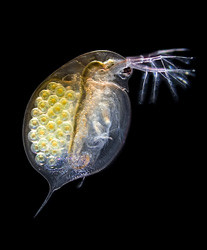Effect of zooplankton on ecosystems
Various chemicals, such as toxins produced by cyanobacteria and man-made pesticides, and natural factors, such as predation and competition for food, can alter zooplankton populations. Plankton must employ different strategies to deal with these challenges, but these strategies exclude one another, which can result in a loss of genetic diversity or even an entire species. The 'Contradicting responses to multiple stressors reduce the resilience of zooplankton community' (CONTRASTRESS) project studied the different strategies used by zooplankton. Researchers investigated how individual populations dealt with different conditions and their role in the loss of biodiversity. Moderate stress such as that produced by bad food conditions or small doses of toxicants can cause Daphnia (commonly called water fleas) to grow bigger and produce larger offspring. This is because larger individuals can cope better with toxins than smaller ones. However, larger size makes Daphnia more vulnerable to predators such as fish. Sediment cores were taken from lakes known for cyanobacteria blooms and good ecological conditions in the past. This enabled the life strategies of Daphnia that were experienced with cyanobacteria to be compared with those that were not. They were also used for hatching experiments with Daphnia. Several concentrations of cyanobacteria were tested on Daphnia. It was already known that cyanobacteria interfere with the filtering apparatus of larger Daphnia, thereby significantly hindering their ability to feed. The results of the experiments confirmed the absence of larger species and the effect on biodiversity. The results of the CONTRASTRESS project contribute to research in the ecology of lake plankton and provide a better understanding of the relationship between zooplankton, cyanobacteria and algae. This will enable better management of the environment and any future restoration programmes for inland waters.
Keywords
Zooplankton, cyanobacteria, Daphnia, biodiversity, pesticide, predation, food web, ecosystem



